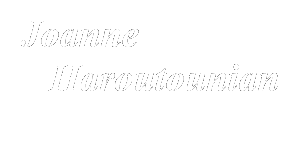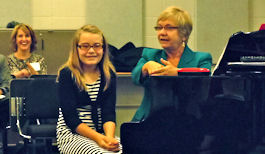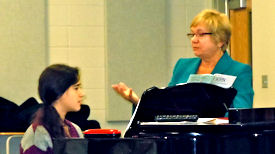





|
|||||||
|
|
The following workshops highlight topics presented in chapters from the book |
Fourth Finger on B-Flat |
|
This session presents an overview of the pedagogy text and its use in piano studios. Teachers will learn the basics of setting up a studio, teaching strategies for practice, interpretation, solving musical problems, and creative studio projects. (1 1/2 to 2 hours) |
Beyond the Notes: Professional Images and Studio Nuts and Bolts |
|
What makes our role as private music teacher unique in the education of our students? This session allows teachers to develop a personal teaching philosophy, examine their studio environments and share effective business practices with colleagues to portray a professional image of independent piano teaching to the immediate community. (l hour) |
First Impressions: A Positive Student Interview and Audition |
|
The initial interview or audition is the essential starting point in establishing a relationship between the parent, student, and teacher. This workshop presents an effective process that combines the gathering of information from parents with a min-lesson that includes activities that provide assessment of student readiness for lessons. (Mini-lesson booklet included). (1 hour) |
Our Calico-Quilt of Students |
|
The beauty of our profession is that we have the opportunity to teach our students in a one-on-one teaching environment over a long period of time. The student crossing our studio door may be a slow learner requiring special attention to reinforcing concepts or a gifted student who whizzes through music, omitting the details. We my be teaching the student who can't focus or sit still because of ADHD, or the autistic child with so much music "inside" for you to nurture. The student who is visually impaired or the Downs Syndrome student adds to the calico quilt of students that may be part of the studio. This session discusses ways to recognize specific behaviors and adapt teaching to meet the needs of these very special students. (1 1/2 hours) |
Teaching the Artist Within Every Child |
|
How can we teach every student in our studio to think and perform as an artist? We spend so much time in our studios guiding students through performance skills to perfection that we may often overlook the value of developing the process of artistic problem-solving and decision-making. This session presents a set of Artistic Ways of Knowing that describes the artistic learning process and can easily be incorporated in teaching strategies at any level. Participants will experience ways to enhance fine tuned perceptual awareness and discrimination, "metaperception," and creative interpretation to develop artistic decision-making. We will discuss the dynamic of performance and ways to develop solid critiquing skills that enhance performance class listening skills. Let's create artistic musicians together! (1 1/2 - 2 hours) |
Musical Problem-Solving in Ten Easy Steps |
|
Musical problem-solving is essential in the development of effective practice routines. This session simplifies the process by describing 10 essential steps that can teach students to find and solve problems in their music - from beginners to advanced levels. (1 hour) |
Connecting with the Kid on the Bench |
|
From the moment a student comes through the door and sits on the bench, there is a dynamic between teacher and student. This session presents examines different teaching approaches as well as learning styles and perceptual modalities that will help teachers more effectively understand how their students learn and how they teach. (1- 1 1/2 hours) |
Smart Practice- Effective Drills that develop Deliberate Practice |
|
Each teacher uses a bag of tricks developed through the years to isolate problem spots for practice. This session will include practice tips from colleagues gathered through a survey of music teachers that helps students build a practice routine that sets goals daily and weekly. Participants learn how to help students build the habit of "deliberate" practice through self-monitored practice journaling. (1 1/2 hours) |
The Performance Portfolio: Insight into Student Perception, Critique and Self-Assessment |
|
The Performance Portfolio process allows students to listen and evaluate their own taped performances as they develop, discover their mistakes, evaluate through ratings and written critique, and guide practice for improvement. The session will explain the full process, show past examples, and provide a live student demonstration. (1 1/2 hours) |
Who's Afraid of the Big Bad Scales? |
|
There is a wide disparity in the development of technique, with some teachers insisting on starting basic finger patterns from day one and others abiding by the gradual process found in piano method books. This session presents an overview of technique basics and a process of continual technical skill development stemming from "Step-by-Step: A Guide for Technique Development" found in the supplementary materials of the book, Fourth Finger on B Flat. (1 to 1 1/2 hours) |
A Palette of Touches |
|
Discuss and explore interactively an array of staccato, legato, and chordal touches that create a vocabulary of tonal color in your students' interpretations and performances. The workshop presents touch exercises and piano literature excerpts that directly apply these tonal colors to intermediate repertoire. (1-1/2 hours) |
Stylistic Subtleties: Developing Interpretive Choices |
|
How can you provide guidelines for students to feel confident in making their own interpretive decisions? What do students learn when they are given choices and "play" with ideas on their own during practice? An interactive lesson demonstrating interpretive decision-making and problem solving teaching strategies will explore these ideas through student performances from intermediate to advanced levels. (1 1/2 - 2 hours) |
Smell the Roses - Savor the Bouquet |
|
How can we get away from the treadmill of deadlines, juggling schedules, and correcting the same mistakes? Renew your teaching focus by exploring ways to develop your students' interpretive decision-making through technical color, fine-tuned listening, and creative connections. Learn how to sculpt technique with an emphasis on sound awareness, expand perceptive listening, and encourage creative composition in your studio. Enjoy a musical bouquet of hybrid tea, floribunda, and carefree climber possibilities. (1 1/2 - 2 hours) |
The Recital Project: A Creative Performance Alternative |
|
Expand the studio recital to include creative performance projects designed and researched by students. Examples of projects for the entire studio, small class, partners, or individual students will be explained. Guidelines for planning projects matching studio interests included. (1-1 1/2 hours) |
| YouTube | Podcast | Tips | Shopping | Contact |